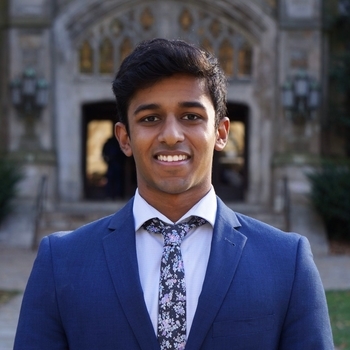
BME Student Explores Ways to Assist People With Developmental Disabilities Through Technology
Student starts Tech Buddies to teach people with developmental disabilities

Student starts Tech Buddies to teach people with developmental disabilities
BME undergrad student Nikhil Mantena has turned his volunteer experiences as a teen into a lifelong goal: Focusing on digital health and education to assist people with intellectual and developmental disabilities.
Mantena devoted his time to helping people who face these challenges, starting with his involvement in high school. “I was volunteering for a nonprofit in the southeast area of Detroit, where I’m from,” he said. “I was tutoring a man named Jeff, who was nonverbal and had other intellectual and developmental disabilities, or IDDs. Over the next four years, I was really focused on teaching him how to communicate using his iPad. So, that’s where I became very interested in this topic. I was spending a lot of time, pretty much every week, helping him for at least two hours at a time. I slowly taught him to use his iPad to not only FaceTime his parents, but to talk to his friends and communicate with his caretakers.”
During college, Mantena has used that experience as an inspiration for a startup called Tech Buddies, which is focused on teaching people with different disabilities. “What we’re doing is trying to use a unique method of abstraction of knowledge to cater to their needs a little better,” he added. Mantena’s passion has extended beyond Tech Buddies, and he is now working on finding job opportunities for the community as well. Ultimately, his vision is to modernize education systems and also provide lifestyle support.
“Our guiding principle is to truly understand the individualized needs of people with disabilities and provide tailored platforms that support autonomous living,” Mantena said. “One of the main goals is to really focus on modernizing special education curricula for communication and to include digital means of communication within that umbrella because oftentimes it’s not a part of the plan. That’s the real goal and evolution that we’re hoping to achieve. I’d like to say that we’re stepping in the right direction.”
Mantena is working on an employment agency called MoJo, which stands for “more jobs.” The organization’s goal is to achieve greater employment opportunities for people with cognitive disabilities. “Currently, only 19 percent of people with this type of disability are currently employed, and many are employed for under minimum wage,” Mantena said. “Our entire mission statement is to increase opportunities and to be sure that those opportunities are above minimum wage so workers can support themselves and live autonomous lives.”
Mantena has a team of people working with him on Tech Buddies and MoJo. “We have a neurologist on the team, an autism coach, a former principal, and also a person who was involved with Angel Place, the nonprofit I was working with in high school,” Mantena said. “For MoJo, I’m currently working with a student on campus who co-founded it with me. One of the biggest things I’ve been trying to do is to try to find people with similar interests to assist. Many of us have a loved one who is affected by this disability, and so it can touch home very quickly, just given how frequently it gets diagnosed. However, this issue is something that often gets overlooked in society. We’re trying to raise awareness about how technological interventions coupled with human interactions can change the direction of people’s lives for the better.”
Mantena’s BME journey has been focused on neural engineering, and he is currently working in Prof. Enrico Opri’s lab on research related to treatments for people with neurodegenerative diseases. ““My main goal is to merge both my educational work for people with IDDs and my engineering research utilizing virtual reality and surgical procedures to enhance the quality of life for patients,” Mantena said. “I want to be able to create better systems that are able to serve people.”
Mantena’s long-term goal is to become a doctor, working in this area and innovating new technologies for health care settings and novel therapies to improve patient outcomes. “I want to create and use technology to educate our medical professionals on how to interact with people with disabilities and provide a higher standard of care. By implementing ground-breaking technologies into healthcare, we can ‘techify’ the industry and enhance the experience for providers, patients, and families. I want to become a doctor to not only serve people on an individual basis but to improve the overall system.”
For those who would like to become involved in this area, Mantena has a Tech Buddies website with a contact form. To get involved with Tech Buddies or MoJo, please contact Mantena at [email protected].